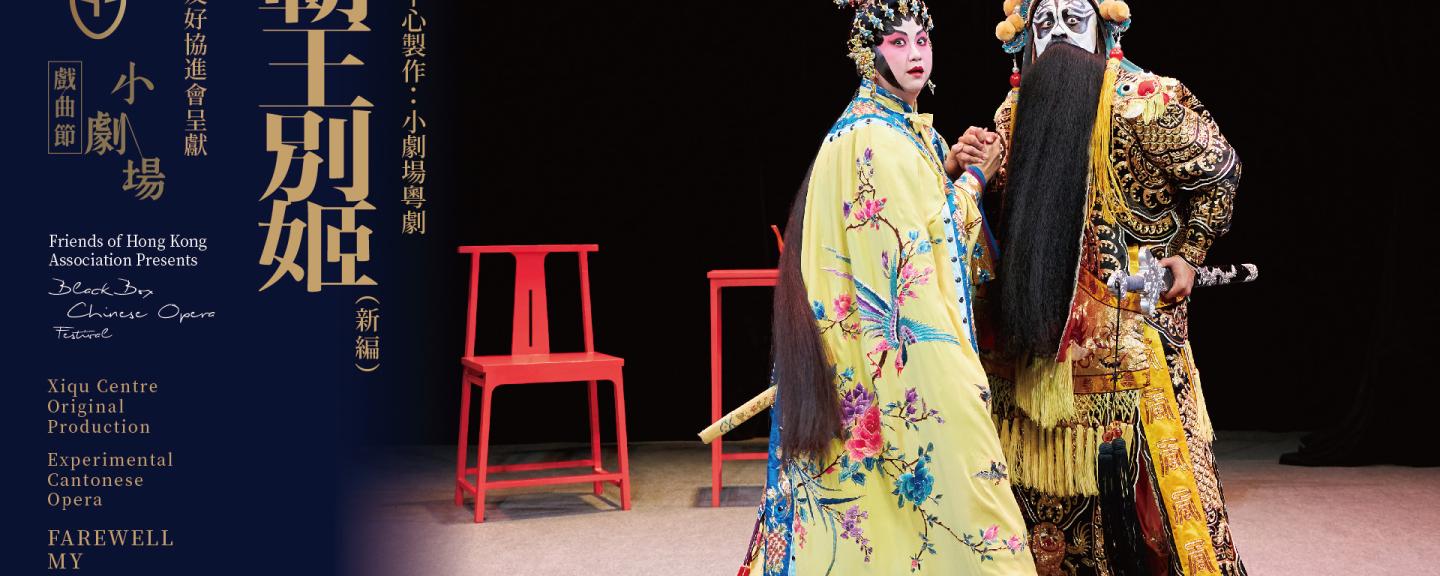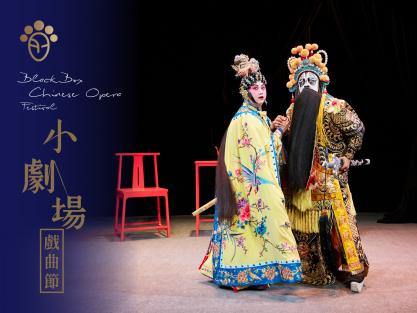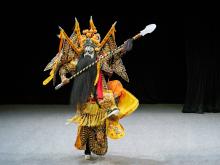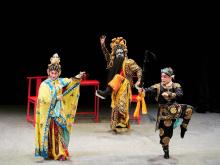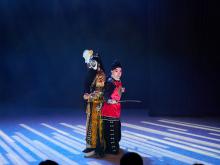Main
Description
小剧场粤剧《霸王别姬》(新编)为戏曲中心首部委约作品,糅合传统与创新意念,结合传统粤剧表演程序及当代舞台设计,细腻地刻划项羽与虞姬之情,及诉说西楚霸王项羽面对江山美人尽失之际的怅然回眸,同时创作团队祈望能给观众展现粤剧从古到今的风格。 此剧曾获邀参与亚洲多个城市之艺术节,屡获殊荣。
所获殊荣:
- 2022年北京纪念中国小剧场戏剧40周年系列活动「中国当代小剧场戏剧40年影响力榜单之40台剧目奖」
- 2018第五届及2019年第六届北京当代小剧场戏曲艺术节「优秀剧目奖」
- 2018年首届中国(北京)演艺博览会「2017年度最佳小剧场戏曲奖」
「这戏的艺术水平之高是香港少见,无论在剧情编排、动作、唱词、走位和演员配合都相当出色。」
──香港粤剧演员文礼凤
「可以入眼、入耳、入心、入梦的品质之作。 此剧武戏文做,新意迭出。 唱腔以梆黄为基础,适当融入当代旋律和技法...... 颇具小剧场特色。 」
──中国戏剧文学学会副会长梧桐(北京)
冠名赞助:
制作:

艺术及制作团队:
监制:钟珍珍*
编剧、导演、编曲:黎耀威、黄宝萱
技术总监:胡伟聪*
舞台设计:黄逸君
灯光设计:萧健邦
音响设计:温新康
服装设计:谭嘉仪
花旦头饰设计及制作:曾俊霖
助理监制:李嘉隆*
制作经理:卢月芳*、陈嘉仪*
监制助理:庄淑雯*、丘颖晞*
演员:
黎耀威 饰 项羽
黄宝萱 饰 虞姬
吴立熙 饰 马童、士兵
乐师:
音乐领导:毛奕俊
击乐领导:陈定邦
乐师(依笔划序排名):何卓晋、何卓涛、高永熙、梁淑妍、陈一凡、黄婉苓、黎家维、钟诗玲、苏绍勋
2016 年首演制作团队:
灯光设计:冯海林
音响设计:袁卓华
服装设计:谭嘉仪
*西九文化区职员
Gallery
Additional info
Tabs
The Xiqu Centre’s first commissioned work, Farewell My Concubine (New Adaptation) blends Cantonese opera traditions and bold innovations, blazing a new trial for a centuries-old art form as part of our mission to transcend traditional frameworks, explore new and original works and forge a new direction for Cantonese opera.
In this reimagining of the historic tragedy, told from the perspective of warlord Xiang Yu, we follow the hero’s downfall, from the siege and defeat of his troops, to his final farewell with his lover and subsequent suicide – each scene pushing him deeper into despair.
The work opens with the entry of Xiang Yu and a prelude demonstrating traditional Cantonese opera performance skills. The minimalist set, a contemporary take on the traditional “one table, two chairs” stage setup, is complemented by modern lighting design, with spotlights used to accentuate Xiang Yu’s isolation. Throughout the production, songs are sung in a combination of archaic Central Plains Mandarin (guanhua) and contemporary Cantonese, with tunes played by a traditional Cantonese opera luo gu (gongs and drums) ensemble. When Xiang Yu bids farewell to his consort, the performers adopt contemporary bangzi and erhuang singing styles while performing xiaoqu (folk tunes) in the archaic dialect. In the final scenes, the introduction of contemporary melodies accentuate Xiang Yu’s psychological turmoil.
Cantonese Opera
Originating in the Guangzhou region of southern China, Cantonese opera is a genre of Chinese traditional theatre that is popular in Guangdong, Guangxi, Hong Kong and Macau, as well as the Chinese diaspora in Southeast Asia, America and Europe. The singing style adopts elements of bangzi and erhuang (traditional vocal and phrasing styles), and combines tunes of various origins, including set tunes from gaoqiang (high-pitched) and Kunqu genres and elements of folk narrative singing. Cantonese opera was inscribed onto the UNESCO Representative List of the Intangible Cultural Heritage of Humanity in 2009.
